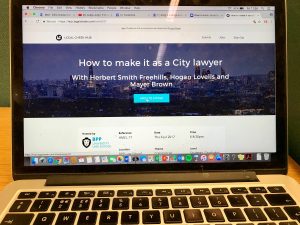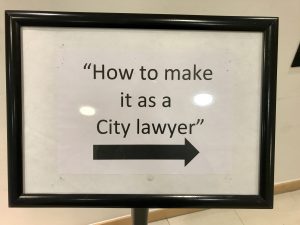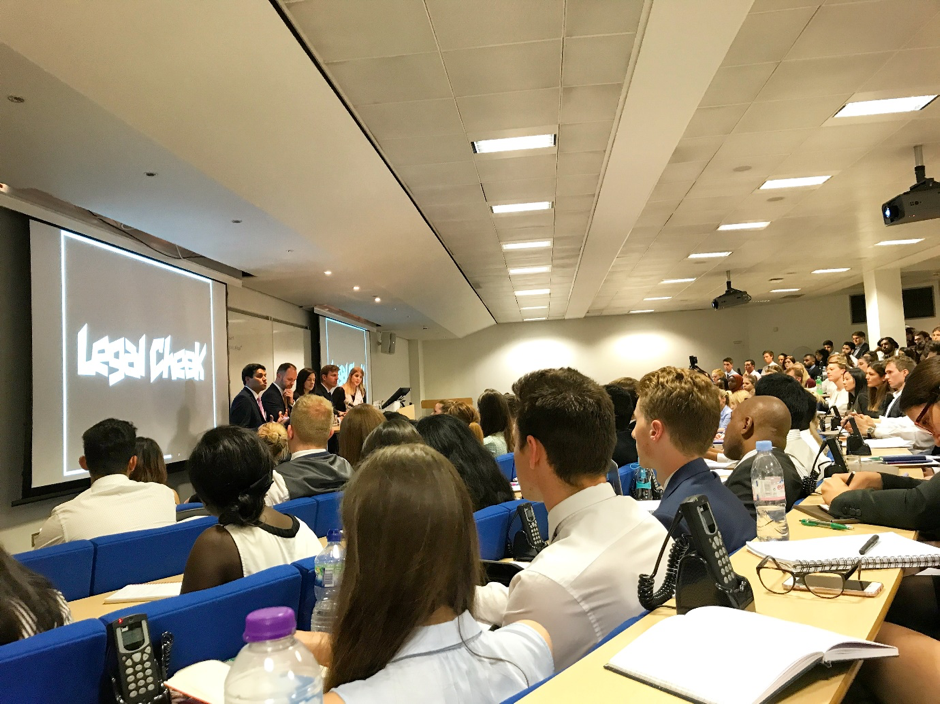Christianah Babajide, one of Lawbore’s legal journalists, is currently studying at the City Law School. Christianah is the Editor-in-Chief of City University Law Society Blog and has written for Legal Cheek, LawStudentHelp , LawCareers.Net and TheStudentRoom. In this piece, she reports back on a Legal Cheek event.
On Thursday 6th July, Legal Cheek hosted City lawyers, lecturers and diversity organisations for an evening of careers advice and networking. The well-attended event took place at BPP University Law School in Holborn, chaired by Legal Cheek’s Features Editor Katie King. With exams well and truly over, over 250 aspiring lawyers flocked to the question-time themed event to discover how to make it as a big shot City lawyer. The aim of the event was to inform students from BAME backgrounds of the key skills needed to become a corporate solicitor whilst offering general application advice.
- Competition Partner at Hogan Lovells – Christopher Hutton
Education: University of Cambridge, LLB (Hons) - Corporate Associate at Herbert Smith Freehills – Siddhartha Shukla
Education: National Law University (India), LLB (Hons) - Finance Associate at Mayer Brown – Emma Sturt
Education: Durham University, Civil Engineering - Former Simmons & Simmons Lawyer – Charlie Radcliffe
Education: University of St Andrews, MA French
Diver-City
With more than a fifth of new solicitors being black and minority ethnic (BME), the legal profession should be proud of its new genetic makeup. Organisations like NOTICED, Prime, Aspiring Solicitors and Rare Recruitment connect exceptional people from diverse backgrounds with opportunities in the legal profession. City firms are introduced to an untapped, diverse talent pool of competent young people which cater to their diverse client base. There has never been a better time to enter the legal profession from an ethnic minority background. The lawyers present each showed testament to this; state school-educated Hutton secured a training contract with Hogan Lovells after studying at the University of Cambridge. Upon securing a place at a top law school in India, Shukla made it to Herbert Smith Freehill’s London office and is now an Associate and Co-Chairs the UK’s diversity network: NOTICED. Sturt worked as a civil engineer for six years before she switched to Law and now works in Mayer Brown’s Finance and Banking Department.
 When asked if firms have moved away from their Oxbridge preference, Sturt stated that Mayer Brown is more open-minded than many firms, and looks to recruit students from a wide range of different backgrounds. She hinted coming from a different background can even be an advantage for a career in Law, “My previous engineering career means that I understand groundwork designs and structures, and know what people are talking about on site.”
When asked if firms have moved away from their Oxbridge preference, Sturt stated that Mayer Brown is more open-minded than many firms, and looks to recruit students from a wide range of different backgrounds. She hinted coming from a different background can even be an advantage for a career in Law, “My previous engineering career means that I understand groundwork designs and structures, and know what people are talking about on site.”
The backgrounds of the four panellists communicated that a training contract at a City firm can be achieved from a range of different backgrounds; be it state-schooled, a non-Russell Group university, coming from a BAME or STEM background – it is still possible to climb up the corporate ladder. And with many City firms adopting a ‘CV blind’ recruitment process that leaves interviewers in the dark about candidate’s educational backgrounds; the legal profession is a step closer to achieving meritocracy by removing bias and allowing recruiters to focus solely on an individual’s qualities and responses.
Importance of Work Experience – and How to Approach It
 After introductions, the event kicked off with useful application tips and advice on how to approach work experience. During vacation scheme applications, they advised showing the graduate recruitment more than just theoretical knowledge of the law. The panelists emphasised competition is fierce with recruiters dealing with thousands, of applications each year, for training contract spaces. Put yourself in the shoes of the person who will assess you; what will differentiate you from the other 3,500 applicants?
After introductions, the event kicked off with useful application tips and advice on how to approach work experience. During vacation scheme applications, they advised showing the graduate recruitment more than just theoretical knowledge of the law. The panelists emphasised competition is fierce with recruiters dealing with thousands, of applications each year, for training contract spaces. Put yourself in the shoes of the person who will assess you; what will differentiate you from the other 3,500 applicants?
Hutton, who sits on Hogan Lovells graduate recruitment team agreed it was important for applicants to be authentic and show their personality. Personality can be demonstrated through other experiences, besides vacation schemes, such as law fairs, careers events and workshops organised by the student law society or careers service. All of this will demonstrate your research and commitment for a career in Law.
For those yet to gain experience, utilise LinkedIn to contact lawyers and build a professional network of contacts. Hutton, who spent a lot of his time at university attending careers fairs and drinks receptions, encouraged students to be brave by reaching out to lawyers. He added, “it is during these conversations you can work out what environment you feel most comfortable in.”
Commercial Awareness
Any law student or legal professional worth their salt knows commercial awareness is prized by graduate recruiters across the board. The panelists emphasised law firms operate as businesses ergo desire applicants who have shown an interest in the business world; awareness of the state of the legal market and stays on top of the technological developments that are transforming the legal profession. Commercial awareness is an impressive skill that can set you apart from other applicants. But why is it so important? Whenever a commercial deal is agreed, commercial lawyers play a key role in drafting and negotiating transaction documents and managing deals, using both their legal knowledge and their market awareness. If one wants to be ahead of their peers and competitors, commercial awareness is a must.
Radcliffe, who teaches the Legal Practice Course at BPP Law School advised students to keep an eye on the legal and business news, be it checking the BBC’s Business and Politics web pages or simply browsing through the Financial Times or City A.M. Developing commercial awareness will put you in a stronger position when applying for vacation schemes or training contracts – as you’ll be able to discuss deals that are going on in the commercial sense. Sid echoed this; “being aware of the commercial developments is a matter of habit, the earlier one starts the easier it gets later.”
Application Tips and Advice
When the panellists were asked what they would tell their younger self, they all agreed to knuckle down on studies – from day one. Radcliffe explained,
“strong academics is a given for anyone serious about a career in corporate law. If you have a firm grasp of the legal principles of contract law, agency law and corporate law, the outline of any business transaction will be clear.”
 When it comes to showing an interest and aptitude in the law, the panel highlighted the need to gain experience and get involved in extracurricular activities— albeit not necessarily linked to legal practice. They advised students to think outside the box by doing some pro bono or charity work in an area of interest or even seeking a part-time job to gain transferable skills. Radcliffe, who worked for an advertisement and marketing agency for months, encouraged students to work within a big City office or a business, to help strengthen transferable business knowledge and client interaction skills firms are known to be impressed by.
When it comes to showing an interest and aptitude in the law, the panel highlighted the need to gain experience and get involved in extracurricular activities— albeit not necessarily linked to legal practice. They advised students to think outside the box by doing some pro bono or charity work in an area of interest or even seeking a part-time job to gain transferable skills. Radcliffe, who worked for an advertisement and marketing agency for months, encouraged students to work within a big City office or a business, to help strengthen transferable business knowledge and client interaction skills firms are known to be impressed by.
And Finally,
With the motivation from successful commercial lawyers, a chance to network informally with representatives from BPP University Law School, Aspiring Solicitors and Co whilst having access to complimentary drinks and a selection of tasty bites, it was truly an insightful evening. The careers event struck a chord with the audience, especially a City Law School graduate Adrianna Wit, who remarked, “I enjoyed the fact that the speakers were coming from different backgrounds and were also at different stages of their legal career.”
As a law student, it’s always gratifying and certainly reassuring to meet leading lawyers in their fields, who have survived the LLB/GDL/LPC course, been there, done that and went on to reap the rewards of all their hard work. It is a comforting thought to know that there is light at the end of the tunnel after all. Despite the panelists addressing implications of Brexit on the legal profession and supply of legal services; one thing is clear – no matter what happens, the legal sector will continue to evolve and adapt to changes in our organic society.
Further reading:
- Hogan Lovells – Chris Hutton: Get out there and meet lawyers, there is no better preparation.
- Herbert Smith Freehills – Siddhartha Shukla: Five qualities that make a good corporate lawyer.
- Mayer Brown – Emma Sturt: An engineering graduates’ journey into law.
- BPP’s LPC Lecturer – Charlie Radcliffe: Law firms are not looking for ‘the polished, finished article.
Thanks to Christianah Babajide, for this helpful review of this panel event.


